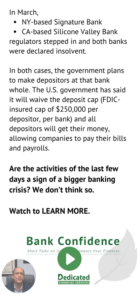The recent bank closures have triggered both confusion and fear. We want you to understand the situation and safely plan when and how to move forward if your accounts need any changes. (To learn more about the current news, Read “Bank Confidence“ )
When determining the least risky ways to invest, consider FDIC-insured accounts, low-risk and low-return investing, diversification, investing apps and resources.
Here are some options:
- High-yield savings accounts
Check for different interest rates at different banks. Be aware that you might be subject to penalties for withdrawals or too many transactions.
- Certificates of deposit
One of the investment options available because a fixed amount of money can be put away for a fixed amount of time to generate a guaranteed return. But be aware of penalties if you need to withdraw the money before the fixed term is over.
- Treasury bills, notes, bonds and TIPS
These are good options for short-term investments. They are not FDIC-insured but you are investing with the government so getting your money back is a guarantee.
- Dividend-paying stocks
There’s no guaranteed for a risk-free return because a company could decide to change policy and stop paying dividends, but they are generally less risky because shareholders will still receive dividends even when the market isn’t doing well.
- Money market accounts
These are a type of savings account, but typically offers higher interest rates and incentives the more money you deposit. They’re FDIC-insured up to $250,000 and offer more liquidity than CDs, but there is a minimum balance that must be maintained and there could also be monthly fees or restrictions on the number of transactions you can make.
- Fixed annuities
These fall under the “safe investments” category but they are contracts that offer guaranteed returns for a period of time. You may be penalized if you withdraw funds too early and it’s important to understand the rules and policies associated with these products.
The options listed should not be considered specific investment advice for an client. Every client’s financial position is different and unique. Having an experienced and highly skilled, Certified Financial Planner to walk alongside you is vital as we all navigate the road ahead.
Should you need a review of your portfolio for a second opinion to weigh your choices, feel free to reach out. SCHEDULE A CONSULTATION










